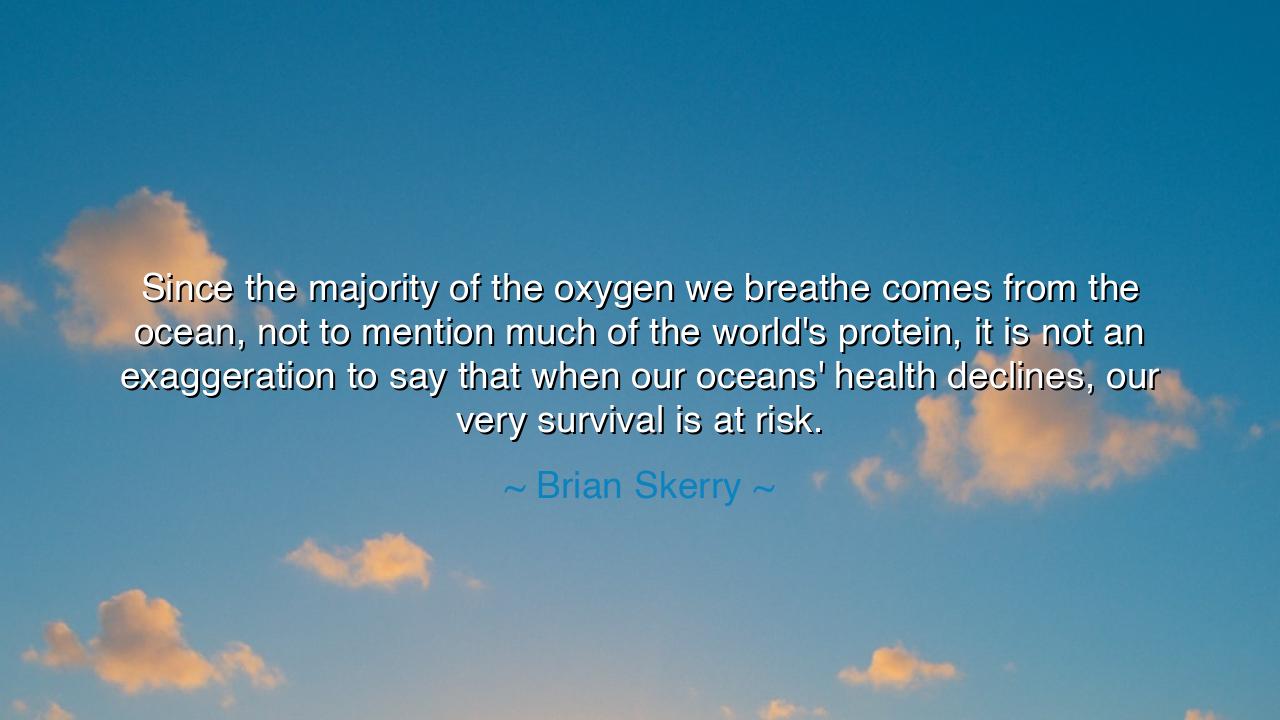
Since the majority of the oxygen we breathe comes from the ocean
Since the majority of the oxygen we breathe comes from the ocean, not to mention much of the world's protein, it is not an exaggeration to say that when our oceans' health declines, our very survival is at risk.






“Since the majority of the oxygen we breathe comes from the ocean, not to mention much of the world’s protein, it is not an exaggeration to say that when our oceans’ health declines, our very survival is at risk.” – Brian Skerry
In the dawn of creation, when the first winds stirred and the earth was wrapped in silence, it was the ocean that breathed life into the world. From its depths rose the breath of existence itself — the unseen oxygen that fills our lungs, the pulse that sustains every living creature. Thus, when Brian Skerry, the chronicler of the sea, speaks these words, he does not speak in metaphor but in sacred truth. The ocean is the mother of life, the great heart that beats beneath all nations, and when that heart falters, so too does humanity. His warning is not of science alone, but of spirit — a call for reverence, for remembrance, for guardianship.
The ancients knew this well. They bowed to the sea as to a god, for they understood that its depths held mysteries and mercies beyond comprehension. The Greek mariners offered libations to Poseidon before setting sail; the islanders of the Pacific sang hymns to the waves, calling them the “breath of the gods.” But as ages turned and pride grew, mankind began to see the ocean not as a giver, but as a servant — a boundless vessel for its hunger and waste. In forgetting our reverence, we invited imbalance, and now the waters grow sick with the weight of our neglect. The ancient harmony between humankind and sea trembles like a harp with broken strings.
When Skerry speaks of oxygen and protein, he reminds us that the ocean’s generosity is not distant poetry, but the very ground of our survival. The microscopic phytoplankton, unseen and humble, create more of the air we breathe than all the forests combined. From them, life ascends: the fish that feed villages, the coral that shelters creatures, the tides that cleanse and renew. Yet we poison these waters with our greed — oil upon waves, plastic in the bellies of whales, coral reefs bleaching into ghosts of color. What once gave us breath now gasps for its own. Truly, as Skerry warns, when the ocean’s health declines, we are not merely harming nature — we are severing our own lifeline.
Remember the tale of the Aral Sea, once vast and full of life, a blue jewel set in the lands of Central Asia. Through human arrogance, its rivers were diverted, its waters stolen to feed ambition. Within a few decades, it became a desert of salt and bone. The people who once drew fish from its bounty now draw dust into their lungs. Crops wither; the air burns; the balance is broken. This is no tale of the distant past — it is a mirror of what awaits when humanity forgets its debt to the waters. The lesson of the Aral Sea is the lesson of Skerry’s warning: when we wound the ocean, we wound ourselves.
And yet, the ocean still forgives. She rises each dawn, breathing life into the air, feeding her creatures despite our carelessness. She offers us one final chance to remember who we are: stewards, not conquerors. We have the power to heal her — to reduce the poison we pour into her depths, to honor the creatures that dwell within her, to protect her from the claws of greed. Every act of conservation, every reef restored, every net withdrawn from her waters is a hymn of redemption. It is not too late, but the tide is turning fast.
O children of the future, take heed: your survival is bound to the ocean’s pulse. Do not think the waves are far from your life because you dwell inland, for every breath you take is a gift from the sea. Learn to live in gratitude for that which you cannot see. Choose simplicity over waste, reverence over indulgence, protection over profit. Stand for the waters as the ancients once did, not out of fear, but out of love — for love is the truest form of wisdom.
Let this teaching endure: the ocean is not other than us — it is our reflection, our breath, our blood. When it thrives, we thrive; when it suffers, we perish. Heed the call of Skerry, the modern prophet of the deep: guard the waters as you would your own soul. For the sea is both mother and mirror — and to care for her is to remember that all life, from the mightiest whale to the smallest child, draws its first breath from the same eternal tide.






AAdministratorAdministrator
Welcome, honored guests. Please leave a comment, we will respond soon